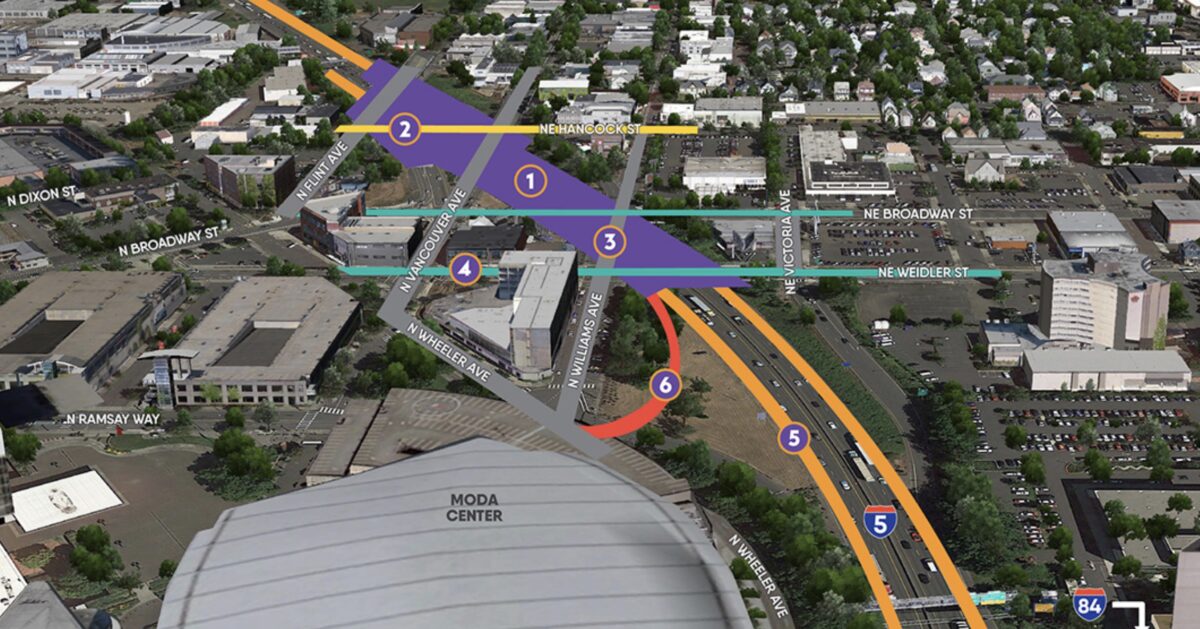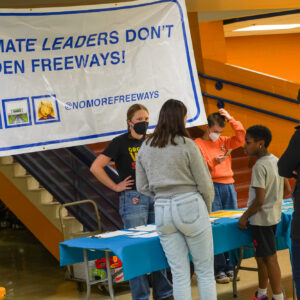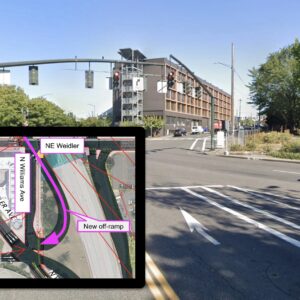The City of Portland is not happy with the direction of the state’s I-5 Rose Quarter project. In a letter released today (PDF) from former Portland Bureau of Transportation Director Chris Warner, the agency laid out their official stance as part of the federally-required comment period for the project’s Supplemental Environmental Assessment (SEA) on the Hybrid 3 Concept.
In short, PBOT says the current proposal from the Oregon Department of Transportation — which would add lanes to the freeway between I-84 and the Fremont Bridge, cover a section of it at the Rose Quarter, and make substantial changes to the surface streets — needs a lot more work. It’s a stinging blow for the project because it echoes — and gives fresh validation — to many of the concerns outlines by activists for years now.
Here are some of the city’s concerns as outlined in the letter:
“… additional technical analysis on local street circulation impacts and possible need for modification.”
“revisions to the project are needed for alignment with city policy as it relates to prioritizing people walking, rolling, bicycling, and taking transit.”
“Lack of clarity in how commitments made as part of the Independent Highway Cover Assessment are provided for. Specifically, how the design will accommodate the community vision to develop a highway cover that can be catalytic in the restoration of high-quality land and provide opportunities for community wealth for generations to come.”
“The project must provide construction mitigations that ensure pedestrian and bicyclist safety…”
“Traffic analysis needs to be completed that reflects that the project area is designated as a Multimodal Mixed-Use Area…”
“… traffic design must consider the impact of pricing on I-5 and the potential for the planned Regional Mobility Pricing Program to change or lower vehicle travel demand in the area.”
“The project must develop traffic management that provides safe and efficient movement of freight and event district traffic management…”
Warner’s letter is informed by major concerns shared with him by PBOT’s modal advisory committees. As we reported early this month, the bicycle and pedestrian advisory committees both issued grave warnings about the project. The Pedestrian Advisory Committee urged PBOT to withdraw support of the Hybrid 3 concept entirely — only to have their position moderated by a PBOT project manager who felt the language was a bit too spicy.
Some of the strongest language in Warner’s letter had to do with how the proposed highway covers would impact future plans to restore a former Black neighborhood that construction of sports arenas, parking lots, and I-5 decimated decades ago. Warner said the current plan for the cover and surface streets, “Requires a fundamental shift in design approach from an auto-focused street network and circulation system to a pedestrian-oriented street scale that improves pedestrian safety and experience and supports place-making and wealth-creation outcomes.”
It’s important to note that the City of Portland isn’t just another voice around the table. They are the state’s main project partner and PBOT must give approval for the design before it gets built. Regardless of any legal requirement to support the project, it will be all but impossible for ODOT to fund this project if PBOT is not comfortable with the plans.
Throughout his letter, Warner made it clear that — far from walking away completely like Portland did under former Commissioner Chloe Eudaly — PBOT remains supportive of the project as long as ODOT is willing to work with them and show a willingness to change. Warner repeated “we must work together” several times in the letter: “We must work together to achieve the technical design refinements that are required for this project to succeed,” he wrote.
While this was sort of a mic drop for Warner, who has the luxury of firing this off in his last days at PBOT, he still might have a presence around this project in his new role with Governor Tina Kotek’s office where he will, “coordinate activities and oversee efforts to better align the Governor’s office management and oversight of agencies and the policies they manage.”
To help buoy their position, PBOT included 135 comments from 13 different staff members (PDF) outlining various questions and concerns. 44 of those comments were made by City Bicycle Coordinator Roger Geller.
From here, the comments will be entered into the official record along with hundreds of comments from the general public and included in ODOT’s application to the Federal Highway Administration. The FHWA is expected to make a decision about the project’s environmental impacts early this year. ODOT will need a “finding of no significant impact” in order to move forward. If the FHWA finds there are significant impacts ODOT will have to mitigate them, which would further delay a project and could be seen as yet another setback.
It’s hard to read PBOT’s letter and square how FHWA could make a “finding of no significant impact.” Stay tuned.








Thanks for reading.
BikePortland has served this community with independent community journalism since 2005. We rely on subscriptions from readers like you to survive. Your financial support is vital in keeping this valuable resource alive and well.
Please subscribe today to strengthen and expand our work.
FHWA is pretty famous nationwide for assisting state DOTs to ram highway projects through cities that didn’t want them.
Wowza those individual comments are pretty blistering. Particularly because they are coming from professional traffic engineers, not us rabble rousing pedestrian cyclists.
C’mon now, Carrie. ODOT will make sure that you pedestrian cyclists can push a beg button and get ten seconds to scurry across the I-5 off-ramp in every five-minute cycle (can’t let traffic back up on the freeway!). What more do you pedestrian cyclists want?!
BTW, “pedestrian cyclists” has my vote for Phrase of 2023.
The difference between you rabble rousers and the traffic engineers is “field experience”. Most PB readers have at least 10,000 hours on the street as opposed to in the car. If Jordan Pederson is right about 10,000 hours of experience, that accounts entirely for the disconnect between you rabble rouses and the traffic engineers. Thanks for the “wowsa” – it made my day a better one.
Wow! I somehow missed Chris Warner’s departure from PBoT, that’s what I get for being sequestered in a cabin on top of a volcano that week. [And I just saw Chris’ name in the PBoT org chart last night.] Thanks BikePortland for bring me up to speed!
I know a lot of activists put effort into this. I thank them all, but particular those with the organization – No More Freeways.
These are great and valid criticisms, but theses issues are not new. I guess it is good that Warner chose to make them, but why did he wait to engage ODOT until right before he leaves PBOT? Will the future head of PBOT be bound to address these comments? I fail to see how Chris Warner working for the Gov. could be useful since he neglected to do anything while he worked at PBOT, he just created an issue for his successor to deal with. The only bright spot I see in this is the possibility of PBOT getting a strong leader who can use these comments as starting point to to propose some tangible changes they need to see from ODOT. All of the comments Warner made are ambiguous, mealy-mouthed requests that could easily brushed aside by ODOT point to an additional review or a an existing standard. PBOT needs to make some concrete demands
Maybe because now he has nothing to lose? He seemed like more of a moderate kind of guy.